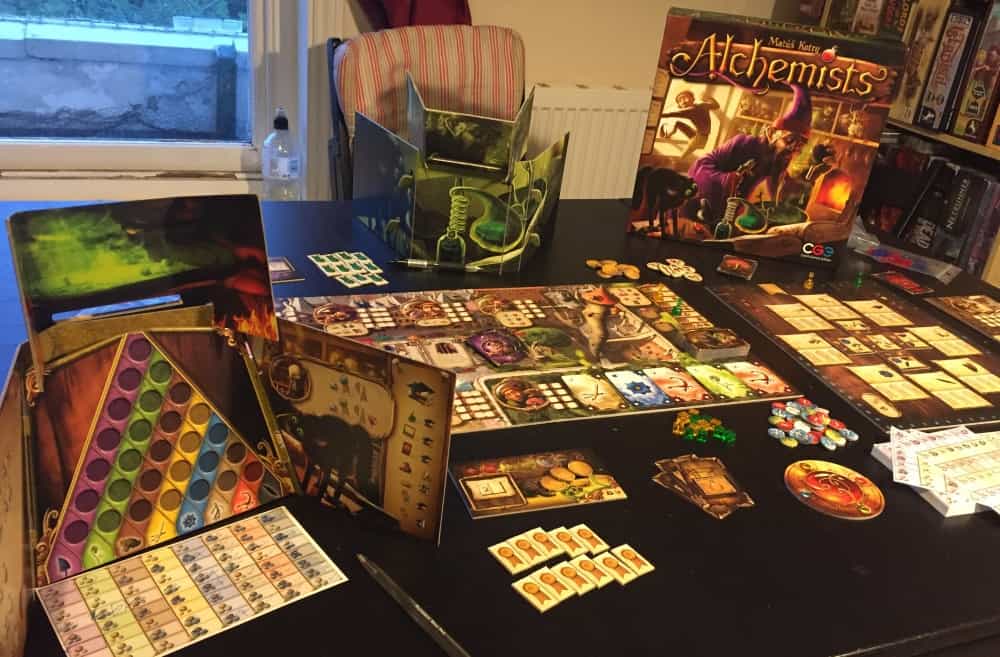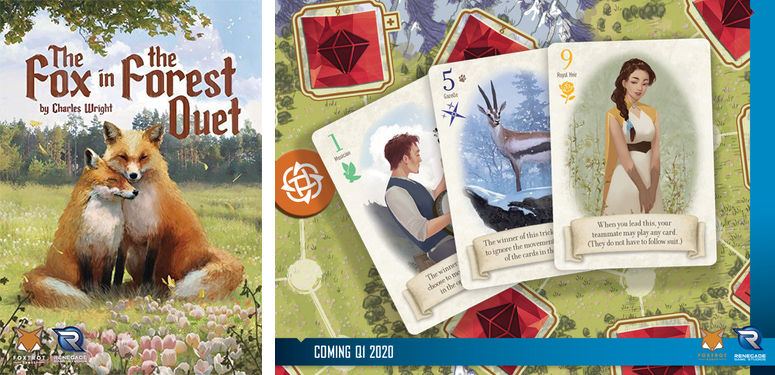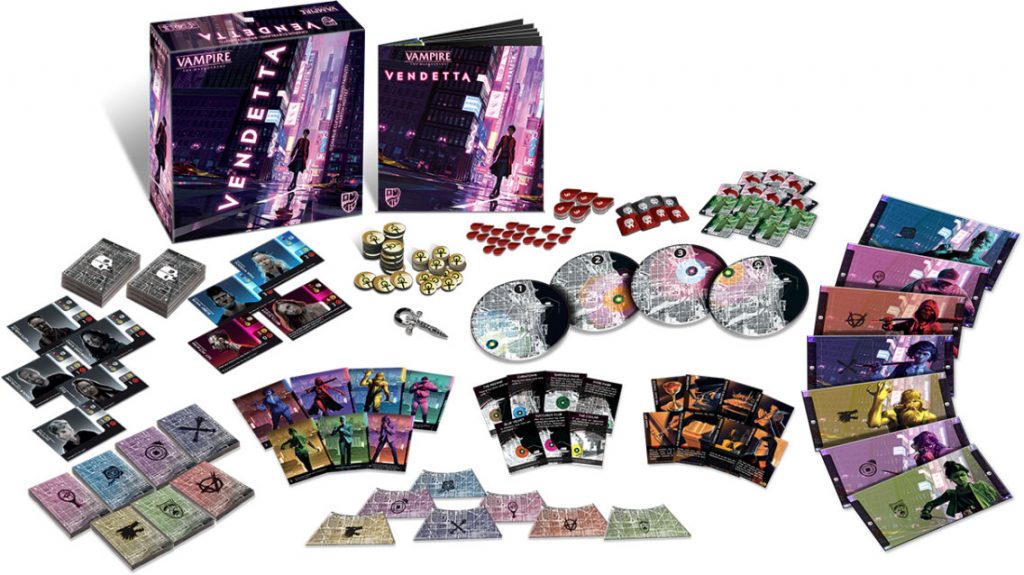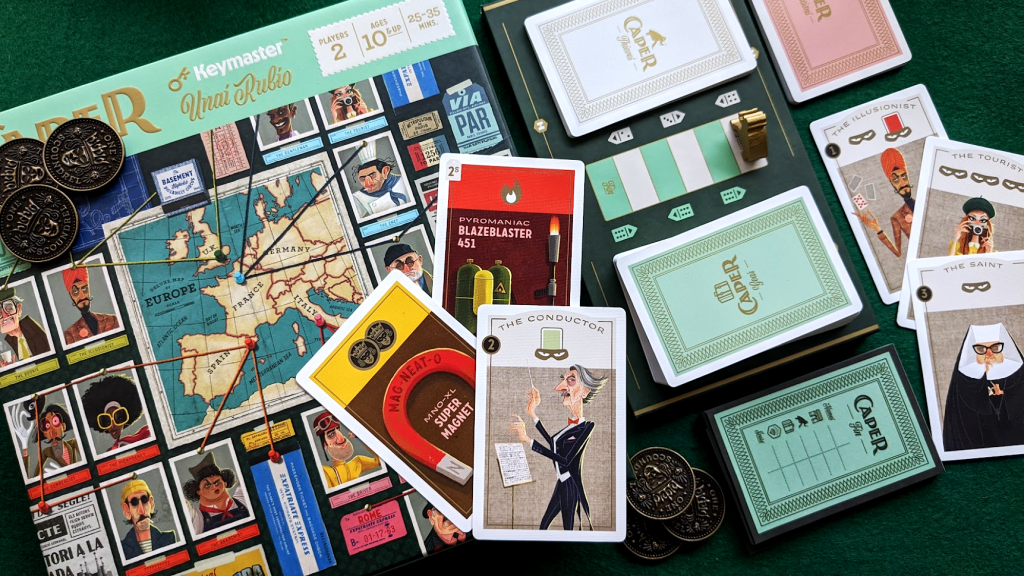Quinns: Paul, I did a crime.
Paul: Quinns, it’s okay. You can confess and be absolved. Our world is one that still has room for forgiveness. Come and tell-
Quinns: I might have accidentally fed my student a pint of poison.
Paul: Ah. It’s all right. You’re not the first person-
Quinns: Also I misled an adventurer and sold them a flask of soup instead of a healing potion, then I published an academic theory that I knew was a lie.
Paul: Right yes well. The thing is-
Quinns: But worst of all, I forgot how funny Czech Games’ board games can be.
Paul: Quinns, I am so excited to write this review that I have got cracker crumbs all over my keyboard. Let’s go.
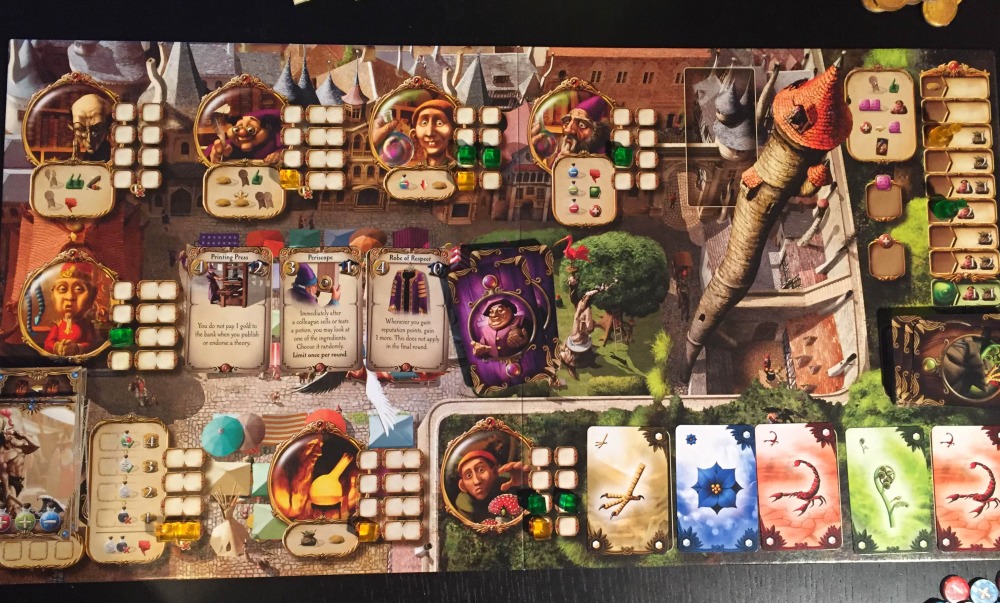
Quinns: So Alchemists is a box containing two games that you play at the same time, and together they want to kick your butt like a pair of tag team wrestlers.
Two to four players all play fantastical chemists, jostling for space in a town that’s clearly big enough for neither you nor your egos. The more recognisable 50% of Alchemists sees players each allocating six cubes on a central map of town (pictured above). These cubes represent what you’re going to do that day.
Perhaps you (yes, you) have to place your cubes first. You decide to grab two alchemical ingredients from a walk through the forest, before swinging by the artifact market and then going home to perform an experiment. Your opponent, Millicent, sees that you’re not bothering to sell any potions today, so she decides to place her cubes such that she also walks through the forest collecting ingredients, but then stops by that desperate barbarian to sell her hopelessly dodgy goods uncontested.
You get to allocate cubes in this manner six times (because the game lasts six rounds), and the alchemist with the best reputation wins!

…The other 50% of Alchemists is, in fact, a deduction game (seen above) played with an app you download to a phone, tablet or laptop. There are eight ingredients you can mix potions with and each one bears a different alchemical symbol which determines the result when you mix it with a second ingredient, like so:

But these symbols are scrambled before each game begins, so only using rigorous scientific method – meaning, feeding potions to students or guzzling them yourself – can you start to figure out which tricolour alchemical belongs to which ingredient.
Paul: And feeding potions to yourself has absolutely no side effects. Nothing can possibly go wrong there.
Quinns: Exactly. But an even bigger problem is Alchemists’s pace! The game advances with the inexorable dread of a storm cloud. Your alchemist won’t be recovered from having paralyzed themselves when adventurers start knocking on your door, offering bags of gold for specific potions. No sooner have you started muddling through that, sweat beading your brow, than the academy wants you to start publishing papers announcing to the world precisely what each ingredient does.
On the downside, you’ve got no clue what each ingredient does. On the up, there’s grant money available to people that publish fast enough, and your opponents will (probably?) have no idea that you’re wrong.
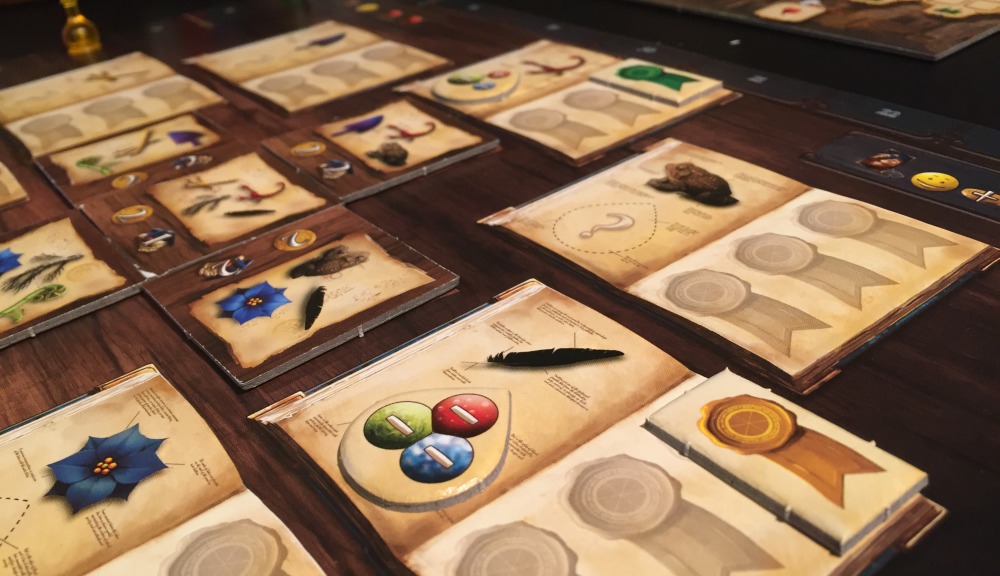
Lots of games with rulebooks this thick see players happily snapping together cards and components that propel you towards victory, but Alchemists feels radically different. In its hands you feel like a criminal, shifting uncomfortably in your seat not because you published an incorrect theory, which would at least be simple, but because you have no idea if your theory is correct. But you should definitely act as if it’s true in order to mess with your opponents!
Just make sure you never accidentally start believing your own lies. All it takes is a single misplaced penstroke on your deduction sheet to ruin all of your calculations…
Paul: And all this is classic, classic Czech Games stuff. The first time I played Alchemists it was like stepping into a modest little time machine, a pint-sized TARDIS, and flying four or five years into the past, right back to when we were trying things like Space Alert, Galaxy Trucker and Dungeon Petz. It has that same mix of the inane, the irreverent and the actually-oh-my-God-really-horrific challenges. You know how you can be a crap breeder in Dungeon Petz, with a stable of depressed animals whose greatest talent is synchronising when they soil themselves, or come home from another Galaxy Trucker trip with three sad people in a pod and a single piece of shitty cargo? Alchemists is hard.
It’s hard in a fair way, at least, and often you all do very badly, but oh boy does it feel appropriate. Your desperation constantly urges you to push your half-baked theories, to get those things printed as soon as you can, because being first is so often more valuable than being right (and let’s not even open THAT can of Paul-rant-worms). You’re under pressure to flog potions that the market demands and, no, there’s obviously no guarantee that you aren’t outright killing the people who drink your brews and… Wait. Wait. Is this some snarky critique of academia and capitalism? I guess I’d have more time to consider that if I wasn’t so short on turns or frantically trying to grab more of the right ingredients as you fumble blindly through the forest, hands clawing at the ground JUST GIVE ME THE RIGHT INGREDIENTS.

Alchemists is a tight tutu to dance in. It does not like to give you room to try a bunch of different things and often the way to be the best Alchemist is… to be the worst person.
Quinns: Yeah, it’s fantastic. In my first game I sold a potion of haste to a hero. According to my deductions a blend of raven’s wing and lotus flower had a 25% chance of working. When the app told me that this combination worked, earning me tremendous wealth and acclaim, I was stunned. I felt like a ne’er-do-well from Grimms’ fairy tales. ”I shouldn’t be here,” I thought to myself, rocketing up the reputation tracker.
For something that looks so much like a traditional worker placement game, Alchemists definitely bent my brain in wild new ways. There’s just so much to slip you up, like spilled surfactants in a crowded laboratory. There’s the fact that any time you do an experiment the two ingredients you used get discarded, so every single time you gain new information the game gives you a firm shove away from it.
Or there was the time I realised that feeding potions to heroes is an experiment that EARNS you money, so obviously you should do that, right? Imagine my face as the app, with its mysterious twinkling sound effect, told me I’d made a potion that was half-right, but not which half, which is what happens when you sell potions that are a bit wrong. Cue me looking at my deduction chart in horror, trying to figure out if this information was any use at all.
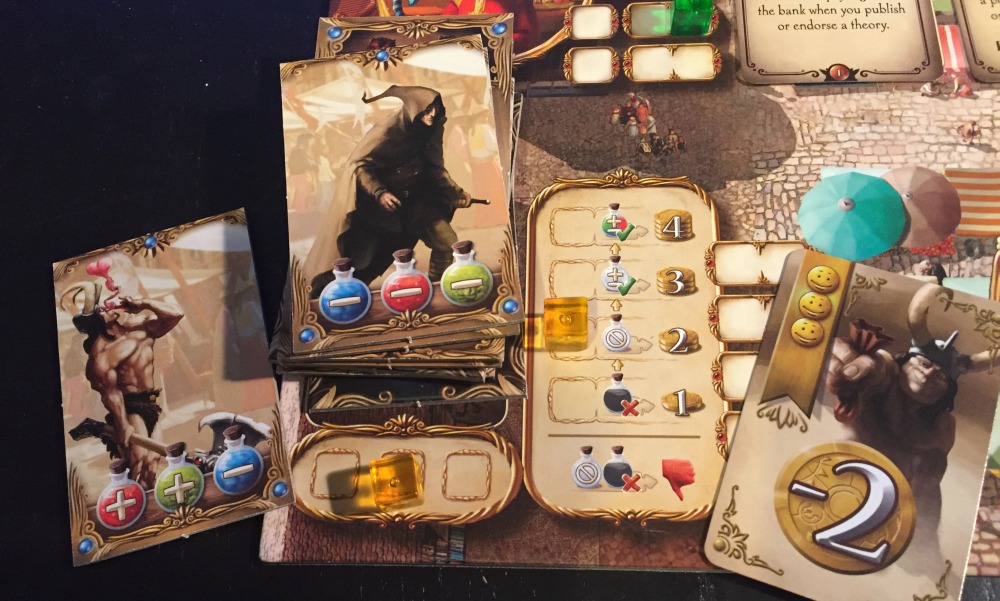
Paul: The app is just magical. I’m a big fan of board games using apps to either supplement your play somehow or help guide you and here it’s… it’s perfect. It’s a simple way of keeping all the most important secrets from you. The process of deduction, the actual work that you put toward trying to figure out what all your reagents do, is not at all easy. It’s a big, big deal when you get that sweet glow of digital approval. You were right all along!
Quinns: Oh man, that caught me by surprise as well. The fear as you finger the button that tells you your results! It brings a lurch in my stomach like I’m stepping off a quizzical diving board. The first time I played I was trembling even when I mixed potions I’d made before, because what if I’d goofed writing down the recipe?
But maybe what surprised me most about this cheap chemistry, this pathetic puzzle, was how much more involved and deep it was than I first suspected. Once you perform your first experiment and eliminate half of the possibilities for two ingredients, the deduction in Alchemists seems like so much busywork, as if academic brilliance is just a few experiments away. But then you start performing experiments that only prove what you already know and, gawping at your phone, you realise that once you’ve narrowed an ingredient down to two possibilities, narrowing it down further requires a very specific experiment with ingredient X, and you have no idea which one that is.
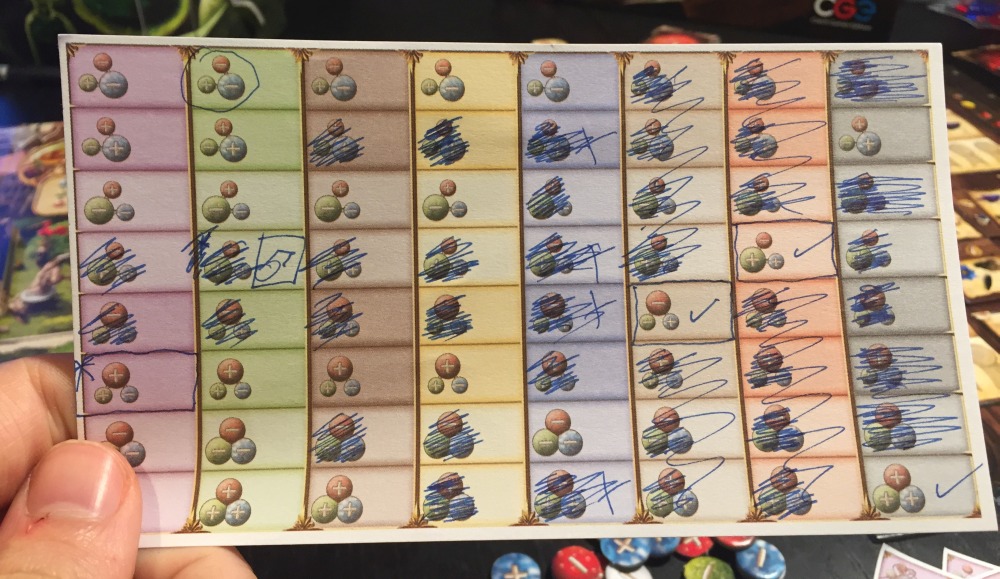
So then – god help you – your eyes drift over to the board showing everyone’s published theories. With caution and luck you can estimate which theories are true, speed up your own progress and then ruin someone’s career by debunking their paper in front of everyone, ruining their reputation. But obviously, if you use someone’s incorrect theory as a basis for your own calculation, you’re up shit creek without a pipette.
Paul: So here’s a thing: I can’t say I was great at Alchemists the first time I played it, since all that stuff was /not/ easy on my scatterbrained skull, but I also got the very same feeling I’ve had with Dungeon Petz, Dungeon Lords, Space Alert, Galaxy Trucker… I felt like I could get better at it the more I played, that it would reward a diligent student. I was better on my second try. There is a game here that appreciates cunning, that encourages you to be wise with your time and a serious, focused sleuth with your paperwork (your paperwork!). God, writing this has made me want to crack it open again, erect all that cardboard and revel in the glory of the desperate, clumsy, fumbling grab for knowledge. And make a barbarian puke.
Quinns: Sure. It’s so sharp, so clever and so strangely emotional.
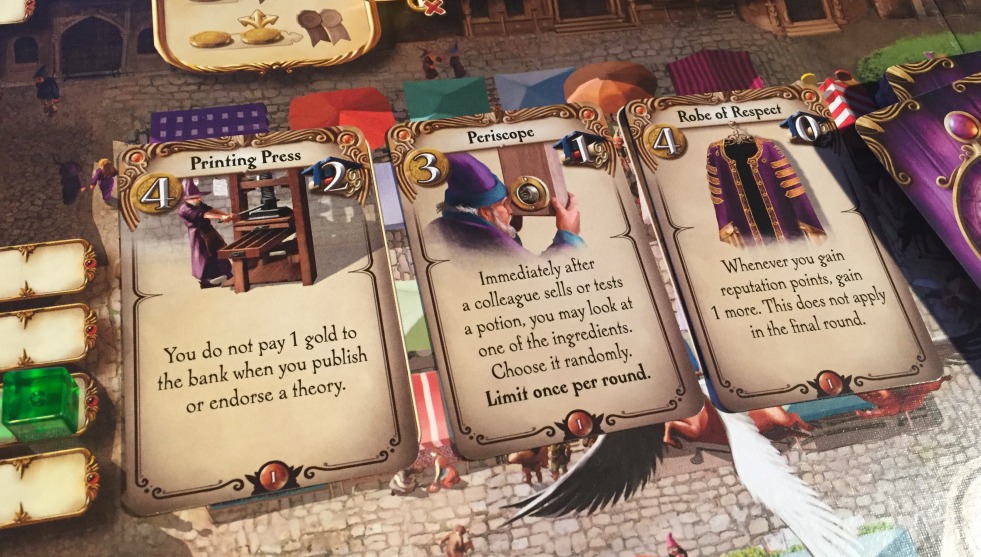
Paul: So does all this mean we’d recommend it? Because… the very first jerk of my knee (the limb that does all my recommendations) says yes. People should absolutely buy it. I want to slap a bunch of qualifiers on that, but after all that I’m still saying yes. Yes! Yes. Are you ready for the qualifiers?
Quinns: I’ve actually got some private notes that I’ve scribbled here, and I’m going to publish my theorem BEFORE YOU!
Paul: No!
Quinns: Ha! So Alchemists has basically won me over. It’s funny, clever, polished and different. Just like Tzolk’in, Czech Games’ previous spin on worker placement (pun not intended), it’s a fantastical contraption that’s clearly been playtested and refined by very talented people.
But just like Tzolk’in, the caveat I’d add before people rush out and buy this box is that I don’t know how much I’m actually going to play it. It’s not simply that playing Alchemists or Tzolk’in feels like having my brain run through a cast-iron laundry press (a not at all unpleasant sensation). It’s that these are big games with big rules explanations where so much of the appeal comes from them being unlike anything you’ve played before. So spending 25 minutes teaching Alchemists and then another 3 hours playing it is going to be a wild ride the first time, but after that this game will be nowhere near the tip of my tongue when people ask “What shall we play tonight?”.
It’s not that that the investment of time, energy and attention involved in playing a game of Alchemists isn’t worth it – it’s absolutely a fun game – but I know from experience that I’m always going to pluck faster, brighter games off of my shelf first.
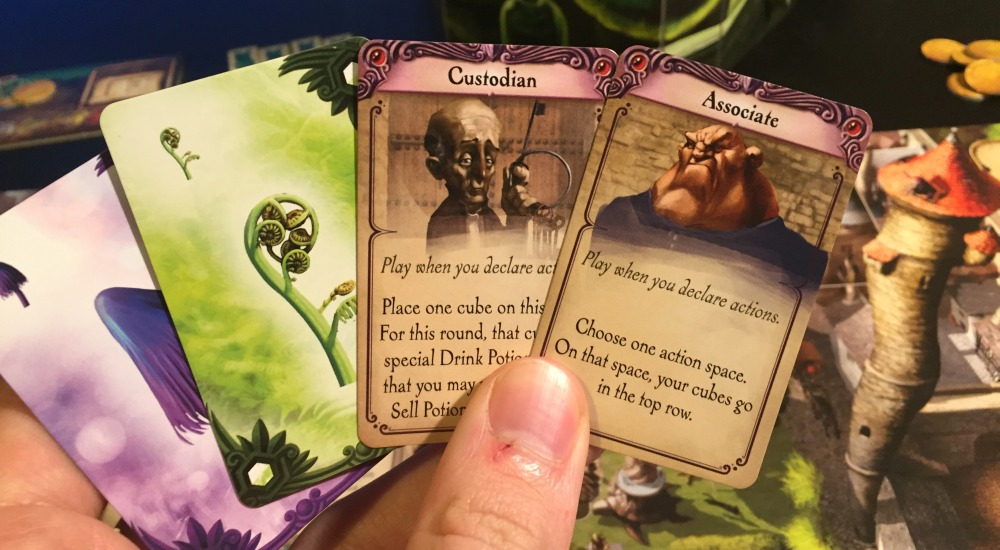
Paul: It’s a heavy one and, again, it has that Czech Games thing where the rules aren’t over-complicated, there are just a lot of little exceptions. Footnotes, if you will. While it isn’t the gigantic, trembling appendix that is Mage Knight, it does kind of remind me of that a little, certainly in that I want to again say that this is “A gamer’s game.” I want to tell everyone that Alchemists is great, but best for people who want to wriggle into an almost cruelly tight, constantly challenging experience. That doesn’t mean other people can’t enjoy it too and my games of it have certainly featured players of different levels of board game dedication riding comfortably in tandem, but… While lots of people like hiking, not everyone wants to haul themselves up a mountain all the time. And I’m the guy who really likes going up his local mountain.
Quinns: Grouse Mountain? I went up that when I visited you! It was nice.
Paul: We are mountain people. We are modern Gimlis. Gimli. Is the plural of Gimli Gimli? Are they like sheep? Are we sheep? Be-
Quinns: PAUL Are you excited for Alchemists’ forthcoming expansion, then? You get to try and animate a golem, on top of everything else. Do you think you’ll seek it out as an excuse to get this box to the table again?
Paul: YES. I hope it means more people will be encouraged to try the game, too. Though I think it’s going to make me a shit wizard all over again.
Quinns: Ooh, look, there’s a complete listing of everything that’s coming up on BoardGameGeek and…
https://boardgamegeek.com/thread/1645796/sneak-preview-part-1
https://boardgamegeek.com/thread/1647862/sneak-preview-part-2
https://boardgamegeek.com/thread/1648976/sneak-preview-part-3
Paul: Oh God. The changes to the deduction grid alone are a little intimidating. It’s turned into a spreadsheet of potential poisons.
Quinns: Oh heavens to betsy I don’t want to play this. This sounds like a box for professional alchemists, not chancers like you and me.
Paul: I am not a chancer, I am an ENCHANTER.
Quinns: I wonder why I thought animating a golem would be fun? Of course it’s not fun. It’s animating a golem. That said (czech it out!) I like that Czech Games are getting some Czech culture into their game because I am such a Czech Games fanboy.
Paul: Look, hold on. That part of it might be okay. It seems to be exactly the same as having a baby, which I am an expert in, having been a baby once and having also seen pictures of babies on the internet. I am also an expert in impressing royal people (this is a total lie), so I can appreciate publishing things in a royal journal. Royal things are good because they are more important and never, ever wrong. Just like real royal humans.
Quinns: Are we out of our depth?
Paul: Yes.

